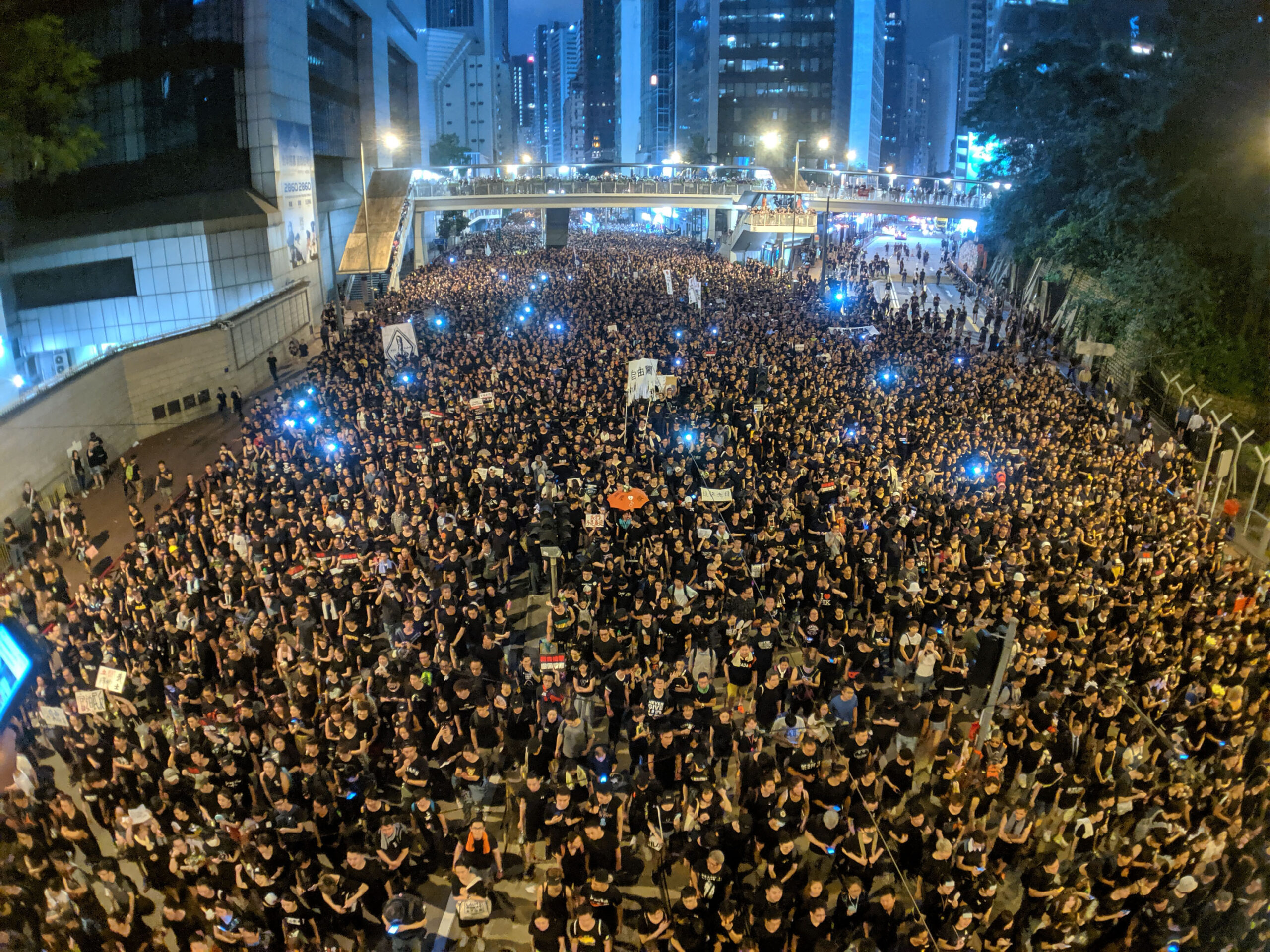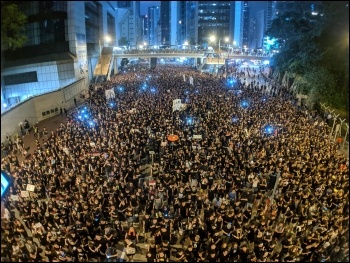Legislation was recently passed in the US that could involve sanctions against China over human rights violations in Hong Kong.
Some demonstrators in the territory welcomed this support, but many will be sceptical of the Trump-led administration.
In spite of its trade war with China, it has ignored the massive human rights abuses which take place daily across that vast country.
As protests on the streets of Hong Kong resumed, clashes were reported in the town of Wenlou, Guangdong Province, just 60 miles away.
“The whole town is protesting!” said one resident, angry at the total disregard of local wishes over a construction project and at the beating by police of students and elderly protesters alike.
“The people of Wenlou are pledging their lives to resist,” said a Weibo user whose posts had been deleted.
Clare Doyle of the Committee for a Workers’ International (CWI – the socialist international organisation to which the Socialist Party is affiliated) reports on the ongoing and intense struggle in Hong Kong.
The massive vote for anti-government candidates in Hong Kong’s District Council elections on 24 November, coming on top of the heroic struggle for democratic rights, has shaken the rotten Beijing dictatorship to the foundations.
The election results have refuted every claim that the students and their allies fighting for real democratic rights do not have overwhelming support from the ‘silent majority’ of the local population.
The newly elected councillors, many of them very young first-time candidates, marched to the occupied university buildings with hundreds of students holding their hands high with the five-finger ‘salute’.
Five-finger salute
Each finger represents one of the now famous five demands of the movement – no extradition, the freeing of all those arrested, an independent inquiry into police brutality in the conflict, the removal of the Chief Executive Carrie Lam, and universal suffrage in all elections.
The turnout was a record 70% of registered voters – twice as many as last time. Around 400,000 new voters had been registered, mostly the younger generation who are widely supported by the older generation. Queues formed around the polling stations and calm reigned in the streets.
Before the election, the pro-administration parties had a majority in all 18 councils. Now the opposition parties control all but one of them after winning nearly 90% of all the seats.
The councils themselves have little formal power to change the way Hong Kong is run or bring an end to the six-month confrontation with Beijing and the puppet Legco administration.
But the results of the vote – the only one on the territory based on one person one vote – are a crushing refutation of their claims that the struggle on the streets is that of a small ‘criminal’ minority.
In spite of the limited programmes of the so-called ‘pro-democracy’ parties, this election represents a sea-change in the struggle between the majority of Hong Kongers and rule from Beijing.
The big question is whether it will lead to concessions that could satisfy the movement or provoke aggression from Beijing.
If the Chinese government resorts to repression, this will widen the circle of discontent in Hong Kong and in the rest of China, sowing the seeds of further rebellion, discontent and, ultimately, revolution.
The student youth need to remain on the offensive, linking up with the newly elected councillors and the working people of Hong Kong to carry the struggle through to a conclusion on the basis of socialist ideas and programme.
Since the beginning of the struggle nearly six months ago, literally millions of the 7.2 million population have been involved in peaceful protests, some brutally assaulted by the police and state-sponsored goons.
Outrage and admiration have spread across the world as the daily confrontations have been televised – unarmed demonstrators viciously beaten, attacked with teargas, rubber bullets, water cannon and even live ammunition.
It is possible that the severely weakened local regime will now try to make some concessions. The proposed extradition law was suspended and then completely dropped, and more recently the local judiciary reversed an order banning the wearing of face masks on demonstrations.
Carrie Lam admitted long ago that she regretted the actions of her government and her Beijing masters have considered her removal. But that could open the floodgates for renewed efforts to extract concessions and give encouragement to the numerous suppressed revolts in mainland China itself.
State forces could crack
There are signs that local forces could crack, with individual officers telling journalists that they didn’t join the police force to carry out this warfare against the population. A new police chief, Chris Tang Ping-keung, is vowing to adopt a new approach. But some of the most intense battles have taken place on his watch.
The siege at the university appears to be at an end. But even as the local election results were being announced, new demonstrations were mounted.
Many of the youth involved see this confrontation with the Carrie Lam regime and its backers as literally a life-and-death struggle. They carry in their pockets a form of last will and testament as they go into battle with a sometimes crazed police force.
The tragedy of the situation is the inexperience of the youth, and the absence of a clear leadership and mass radical workers’ party, able to channel this heroism into a struggle that can achieve all the now famous five demands, but that goes far further.
As the CWI has advocated from the beginning, not only are democratically-elected committees needed in every workplace and local neighbourhood to link up and provide leadership to the movement.
But a programme needs to be drawn up that aims for power to be taken into the hands of the working people, ousting not only the spineless regime in Hong Kong, but spreading the struggle to the rest of China, including Taiwan and Xinjiang.
It must be only a matter of time before workers and youth in the ‘People’s Republic’ are affected by what they hear is happening in Hong Kong – not believing the lies about foreign-backed subversion, but seeing the need for struggle against a regime that is prepared to use arrest and torture to hold a people in submission.
Regime unnerved
The Hong Kong election results will have served to unnerve the Xi Jinping regime. It had already viewed with alarm the reversal of the ban on demonstrators wearing facemasks. This had been defied, anyway, from day one without arrest or punishment.
The so-called Communist Party can rail against the defiance of the protests and the president has talked of “smashing bodies” and “grinding bones to powder”. But this is not 1989 when the revolt of workers and youth in China was crushed by the tanks of the People’s Army, killing thousands in Tiananmen Square.
At that time, the ruling bureaucracy could lean to some extent on the rural masses and certain layers in the urban areas. It is much more difficult for them to intervene with impunity now in Hong Kong.
The small territory is home to the biggest concentration of millionaires in the world. Many of them have big money at stake in the Chinese economy.
Many of China’s ruling-party elite use the special status of this ‘financial hub’ to protect and increase their vast fortunes. Laying waste to this haven would be much more difficult and cause big problems for the regime in Beijing. The world is watching and repression has already rebounded on them.
The Hong Kong economy has already been quite seriously affected by the events of the past six months and gone into recession. The Chinese economy is struggling with slowing growth and an on-off trade war with the US.
The nature of the state in China is still a very special form of state capitalism. Politically, the so-called Communist Party aims to keep the lid on freedom of expression, organisation, strike and protest and has no intention of allowing socialism, let alone real communism to bloom!
Xi Jinping has tried to consolidate his personal power, declaring himself president for life, and the recent plenum of the ruling party avowed a tough line against the Hong Kong protests.
Professor Steve Tsang at SOAS, University of London writes: “There is no indication that China’s President Xi Jinping wants to destroy Hong Kong”. But he also says that if the Hong Kong police cannot put an end to the protests, “the Chinese leadership will ultimately send in its security forces to subdue them” (Evening Standard 22 November).
Others say it would be of no help to Beijing if the movement in Hong Kong were crushed. Not only would there be anger in other parts of the vast country of China, but there would be outrage worldwide.
The labour movement internationally, already inspired by the youth in Hong Kong, would be forced to raise its voice and condemn Beijing’s action.
New era
A new era has broken – of dictatorial methods of rule being challenged by mass movements, including general strike action – in Chile, Lebanon, Iraq and elsewhere. The days of quiescent and ineffective representation of working and young people in Europe are also numbered.
Participants in the movement in Hong Kong have learned a great deal. It needs an organised force and the backing of working-class power, a mass popular party of workers and students who have earned the right to have a major say in the future of society.
Local representative committees and elected workplace bodies need to link up. The slogan, “our revolution”, needs to be channelled into calls for general strike action and a widespread campaign for a revolutionary constituent assembly.
Only by stepping up the fight against dictatorship and for democratic socialism can the movement be taken to a conclusion.
With the majority of the people in Hong Kong in a defiant mood, now is the time for a fight to the finish. Fighting for the right of genuine self-determination in Hong Kong, Taiwan, Xinjiang and even Tibet needs to be part of an historic struggle for a socialist confederation with China.
Huge lessons are to be learned from the current titanic struggle for democracy in Hong Kong. But the study of the historic mass strikes of the past is also vital.
In May of 1925, the one-time “fortress of British imperialism in China” was brought to a standstill, resonating throughout China – a country in turmoil at the time. This experience must be used in the fight to build an invincible movement to end capitalism and build socialism across Asia.
- Read article in full on socialistworld.net









